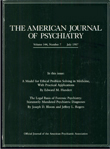Impact of Clozapine on Completed Suicide
Abstract
OBJECTIVE: Clozapine has been found to be superior to typical neuroleptics in ameliorating the symptoms of refractory schizophrenia. This study evaluated clozapine’s effect on the rate of death due to suicide. METHOD: All patients over a 4-year period who initiated treatment with clozapine while hospitalized within the Department of Veterans Affairs (VA) system (N=1,415) were matched with a schizophrenic control group (N=2,830) by propensity scoring—a widely accepted statistical method that has been used relatively little in psychiatric research. Centralized VA databases and a national death registry were used to identify all deaths within the two groups, along with listed causes, for the 3 years after discharge. RESULTS: Veterans exposed to clozapine while inpatients were significantly less likely to die during the follow-up period than those in the control group, but this was entirely attributable to the much lower rate of death due to respiratory disorders in the clozapine group. There were no significant differences in rates of suicide or accidental death. CONCLUSIONS: These results fail to support the hypothesis that clozapine treatment is associated with significantly fewer deaths due to suicide.



